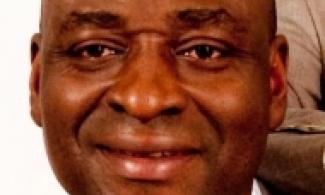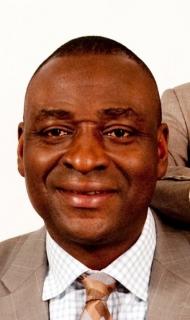

“I am personally involved in a clearly targeted bomb attack today at about 2:30pm on my way to Daura.
“The unfortunate event, clearly an assassination attempt came from a fast moving vehicle that made many attempts to overtake my security car, but was blocked by escort vehicle.
“We reached the market area of Kawo where he took advantage of our slowing down and attempted to ram my car and instantly detonated the bomb which destroyed all the three cars in our convoy.
“Unfortunately, when I came out of my vehicle, I saw many dead bodies littered around. They were innocent people going about their daily business who became victims of mass murder.
“Thank God for His mercy, I came out unhurt, but three of my security staff sustained minor injuries. They have since been treated in hospital and discharged.” - General Muhammadu Buhari (Ret) (Statement released to the press, Wednesday, 23 July, 2014)
Now that General Muhammadu Buhari himself has released a statement indicating that he was the target of an assassination attempt in Kaduna, we need to stop and think as a nation going forward.
First, I note that many partisan supporters of his are gleefully pointing to this as a justification that General Muhammadu Buhari is not a sponsor of Boko Haram as certain elements within the ruling PDP have been implying. As that reasoning goes, if he were, the terrorists wouldn’t be targeting him. But the fact that such thinking has taken root at all in the political space is an indictment of our politics, because the accusation itself is based on a lot of political hot air, rather than any shred of respectable evidence.
As I write, the two main political parties are yet to make any official statements, but if we follow their antecedents, you would expect that they would, as usual, politicize this and lose the sense of what we should be taking away from this incident and what we should be acting on as one as a nation. President Goodluck Jonathan is right to call the attack "an odious attempt to inflame passions and exacerbate disquiet, fear, insecurity and sectional divisions in the country”, but whether his own media people, his party and the opposition are going to read the script that well going forward is another matter. Desperation seems to rule the Nigerian political roost on all fronts nowadays.
Though, at the moment, Boko Haram are yet to claim responsibility for the attack, there is enough uncontested information for us to make informed speculations, all of which would easily lead us to conclude that they are behind the attack. For instance, even from Buhari’s account, we know that the attack on his convoy was carried out by a lone suicide bomber, after another suicide bomber on foot had lunged at a moderate Islamic leader, Sheikh Dahiru Bauchi at the prayer ground at Murtala Muhammed Square in the commercial area of the city where thousands had gathered for prayers.
Even though the suicide bombers in the twin attacks did not succeed in killing their main targets, reports say over eighty people were killed in both attacks. Clearly, these attacks bear all the hallmarks of a Boko Haram attack. Nigeria is a funny place politically and we must thank God that the nature of the attack has removed any doubt about its perpetrators, because we wouldn’t have put it past some to claim it’s an Abuja-inspired attack, because Buhari is such a feared opposition leader that forces loyal to President Jonathan would want him out of the way before 2015 and blame it on Boko Haram. Of course, that claim would be silly and unsupportable, but with Nigeria, with the kind of politics being played now, anything to stain President Jonathan seems fair game. We can see it clearly from the fact that many opposition figures do not respect the office of the President or the man at all and that’s a big shame. We should be grateful that the way this happened reduces the chance for these characters to ratchet up their mischief.
Beyond all that, what I would personally advise is that Nigerian political leaders must see the significance of this attack in the context of what we have suffered as a nation in national, communal and personal security for the past five years of Boko Haram and related terrorism. It is instructive that while this menace has been on, the political opposition, of which Buhari is a key figure, has treated it as though it is the problem of President Goodluck Jonathan and his party and some of their members have spoken and acted in all manners indicative of that belief. They have obviously framed a political strategy around presenting the President as clueless in matters of national security, even where they themselves have never provided workable suggestions or solutions on the matter.
More depressingly, Buhari has made himself the most high profile defender of the Boko Haram organization, even if indirectly. He has called for the government to stop arresting the Boko Haram suspects, to stop killing them and to get into negotiations with them as they did with the Niger-Delta militants. He has compared Boko Haram to the Irish Republican Army (IRA), implying that something like the Good Friday Agreement that paved the way for the political process that led to peace in Northern Ireland should be employed in Nigeria. Yet, he knew like all Nigerians that the government has provided all avenues for the Boko Haram to come to the table, but they won’t. In fact, when Buhari himself was called upon to be part of the discussion to end the bloodshed, he pointedly refused and in a most unstatesmanlike manner said he was not going to join such an effort, because he was not part of those who created the problem.
For years, Buhari consistently blamed the Goodluck Jonathan administration for the Boko Haram insurgency, even though everyone knows it started during the President Olusegun Obasanjo administration before it became a full-blown insurgency under President Umaru Yar’Adua due to the extrajudicial killings undertaken by his administration with a view of quelling the then nascent insurgency. Buhari for years would not condole with victims of Boko Haram atrocities or publicly condemn the insurgency until very recently in May when political calculations made him do so after the Boko Haram kidnap of the Chibok girls.
Indeed, if we are honest, no matter the side of the political divide we are, we cannot doubt the fact that General Buhari has never been an enthusiastic opponent of the Boko Haram terrorists. I’m not saying he’s a sponsor or supporter, but he has clearly attempted to reap political benefits from it, which makes the PDP media machine always attempt to imply that he is a supporter. Of course, discerning political observers know that whatever the origin of Boko Haram, as presently constituted, it is actually a Nigerian franchise of international terrorism and those with control over the organization are not part of our political class. If indeed the Boko Haram are behind this Buhari attack, as I suspect they are, then here is a clear and unequivocal message from them to us that nobody is immune from their murderous anger. Even though there are opposition politicians who speak as though Boko Haram is their Cerberus, we must now know that Boko Haram is not the military wing of the APC. It is a terrorist group that we all must try to deal with as one.
So that is the message of this Buhari attack. It is time for the government and PDP media machine to tone down their rhetoric, which claims or implies that Boko Haram is being sponsored or supported by the opposition, no matter what some individual opposition politicians say to disparage the effort of the Federal Government in this regard. Doing this is not a sign of weakness, but of strength. More importantly, supporting such notion of political sponsorship in the media only energizes the Boko Haram people, because it indicates infighting amongst the political class over national security, which is something they’ve proved adept at cashing in on. Of course, this is by no means suggesting that the security services should not continue to do their job of monitoring all persons, no matter their political party affiliations and no matter how highly placed, once they have reasons to suspect them to be part of the threat to national security, including being collaborators with Boko Haram elements in any way.
Having said this, the leadership of the opposition must also now begin to appreciate what is at stake here for our nation. The desperation with which they’ve been going about this business of claiming power at the centre has made them lose sense of the fact that national security should be out of bounds to politics and politicking. I had thought that the All-Parties Summit convened by the President was going to be the beginning of proper collaboration between the parties and our national political leadership over Boko Haram, but from all indications thereafter it’s proven not to be. So, here is an opportunity for the opposition to go to the drawing board and prepare a proposal to the government, a proposal that can get everyone working together to address the menace of the terrorists.
Of course, conduct matters. They must rein in their desperate attack dogs who would want to use national security to attack the President or PDP, assuming that this is their political underbelly. They must know that it’s not the underbelly of the PDP or Jonathan, but the underbelly of the nation. We all have to do something about it now. The political parties can start by removing national security from the list of campaign issues while they work together with the government as suggested to provide solutions. Buhari can lead that effort. He has the training and the stature for such a job. Today’s attack against him should tell him it’s the only patriotic thing to do here.